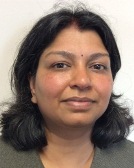Water sustainability and nanotechnology
NPEP Newsletter, June 2016
 Prof. Shivani Bhardwaj (Mishra) is a Professor at the Nanotechnology and Water Sustainability (NanoWS) Research Unit, College of Science, Engineering and Technology at the University of South Africa. The Nanotechnology and Water Sustainability (NanoWS) research unit is a strategic research niche at the College of Science, Engineering and Technology (CSET) that addresses current and emerging issues relating to water quality and water scarcity.
Prof. Shivani Bhardwaj (Mishra) is a Professor at the Nanotechnology and Water Sustainability (NanoWS) Research Unit, College of Science, Engineering and Technology at the University of South Africa. The Nanotechnology and Water Sustainability (NanoWS) research unit is a strategic research niche at the College of Science, Engineering and Technology (CSET) that addresses current and emerging issues relating to water quality and water scarcity.
Prof. Bhardwaj explained more about her thoughts on her academic journey, nanotechnology and water sustainability.
How did you initially get involved in nanotechnology?
Soon after submitting my PhD thesis in 2002, I joined the National Physical Lab [equivalent to the CSIR in South Africa] in New Delhi. I was engaged in a research project in the field of developing silicon carbon nanomaterials using sol-gel polymer techniques and carbon-thermal reduction. Looking under an advanced microscope, fascinating images at nano scale size motivated me to indulge in the field of nanotechnology.
What areas have you focused on within the nanotechnology sector?
Nanotechnology merges with every discipline of science, engineering and technology. Since my PhD was based on studies on treatment and utilisation of industrial wastewater, I thought of developing nanomaterials that can be used for the purpose of water treatment.
How can nanotechnology be applied in water related issues?
Nanotechnology can be used for purifying waste water. It’s also important to note that nanotechnology allows researchers to develop different types of nanomaterials that can be used as adsorbents, ion exchangers, photo-catalysts, and membranes in order to remove a variety of chemical pollutants and microbes.
Do you believe nanotechnology has the potential to change the water related challenges the country and world face?
Nanotechnology provides a platform for industrial, domestic and municipal water treatment plants to efficiently treat and reuse water. Climate change, global warming, extinction of forests and ground water depletion have affected drought conditions around the world. I firmly believe it’s high time that new technologies get developed to save and provide clean water. I believe nanotechnology holds the key to most of these questions.
Can you give us some simple examples of how this technology can work?
Nanotechnology is here to provide new and novel nanomaterials that can be integrated into existing models and also new prototypes for cleaning the water. A simple example is the water filters available in local superstores and pharmacies. The filters in these bottles can be modified with more efficient broad spectrum nanomaterials and ultimately be used by more people.
What are the other ways that nanotechnology can be used in our day to day living?
The possibilities are diverse and varied. Nanotechnology is a blessing to science and engineering technologies as it can be explored for various purposes and applications. These include strategic material for defence and safety, environmental applications, health care devices, sensors, targeted drug delivery systems, tissue engineering, implants, paints, dyes, polymers, petroleum products and many more.
In your view, what hinders more women from getting into STEM related careers?
STEM related careers are demanding and need time and patience in the fast growing world. The higher qualification is an eligibility to move forward but it also requires innovation and a passion to do things differently using the fundamental knowledge and understanding. This becomes a huge challenge and at times a major cause of demotivation.
What does the future hold for you?
Today is what exists and allows us to fulfil our objectives in terms of executing plans and thoughts, while building a firm foundation for tomorrow. For me, it is important to continuously learn and innovate in order to progress.
Prof. Bhardwaj has had many local and international collaborations and published over 75 research articles in peer reviewed international journals. She has also been acknowledged as a rated researcher with a C-3 rating by the National Research Foundation and is a panel member for a number of NRF grant applications and South African Research Chair Initiatives, a dedicated academic and a passionate researcher who believes in non-stop learning.
The esteemed academic has also delivered a number of plenary, keynote, invited lectures and expert talks and has been recognised as a Fellow of the Royal Society of Chemistry (FRSC). Prof. Bhardwaj is a member of various science societies.
South African scientist honoured
Water sustainability and nanotechnology
Nano-composites could provide a solution to clean and safe water
The future of nanotechnology and water research
7th International Conference on Advanced Nanomaterials (ANM2016)
Nanostructured Materials Conference (NANO 2016)
International Conference on Nanomedicine and Nanobiotechnology (ICONAN 2016)
